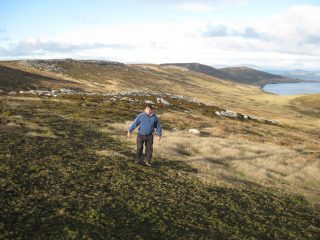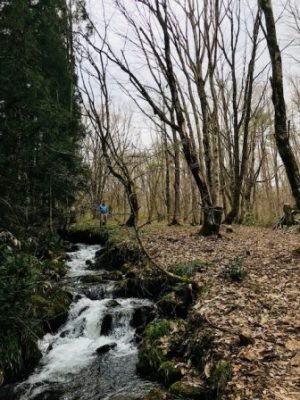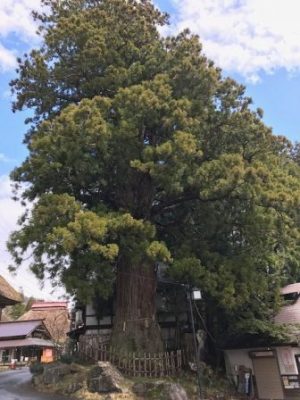英語発音矯正ザ ジングルズ開発者からのメッセージ
「Earth Day」にむけて!
親愛なる地球の皆様へ
地球の日おめでとうございます!、地球に祝福を!
母なる地球よ、おめでとう!

2013年フォークランド諸島
メスの象アザラシが2メートル以内に接近してくれた
尊敬の念を感じてくれたか!

適切管理により、
フォークランドの様な小国でも広大な空き地は可能

4日前日本の長野県の管理地を訪れた
残念ながら、小川沿いの高木が数本伐採されていた

途中で訪れた長野県戸隠神社の樹齢800年の杉

戸隠連峰
「地球の日」は1970年4月22日に生まれました。
その日以来、特にアメリカ人が工業生産が汚れた空気、汚染された川、動植物の破壊をもたらしていることを認識し始めると、人間は私たちと仲間の生き物を育んだ惑星の生態系を破壊しているという事実を認識しました。
1970年以来毎年4月22日、「地球の日」はある時は歩みを緩め、ある時は激しくあゆみを続けながら、世界中の人間が遵守すべき日の一つとして立ち位置を確立してきました。
なされるべきことは、まだまだあります。 これから申し上げる数字にはそれが顕著に現れています。(私の推定であるものが含まれていることはお伝えしておきます。)
1970年と大気の質を比較すると、現在主に改善されていることは、世界中のあらゆる場所に存在する有害な微粒子やガスをより正確に実時間で測定し定量化できるようになっていることです。改善していないのは、空気中の化学物質を破壊する生命の量が増加し続けているという点です。
改善とは逆に破壊が進んでいることを知るには、私たちの仲間に目を向けると明らかです。
最も顕著な悲劇の一つは、アフリカゾウを中心に生じています。 この美しい動物の数は現在、ケニアとウガンダ、アフリカの他の地域では保持されていますが、オーストラリアの面積相当あたり100万頭を超える数でしたが、現在は、グリーンランドの面積相当に縮小した地域に、わずか40万頭しかいません。密猟者による虐殺によるものです。地球儀をご覧いただければ、いかに 狭い面積で象が生きなければならなくなったかがわかります。象の生息場所の70%以上が奪われてしまいました。
「少数派」である国や文化に関しては、フォークランド諸島があげられます。広い国に領土を搾取(略奪)された小国の一例です。1970年代、イギリスは、フォークランド住民の意思を無視し、フォークランドをアルゼンチンに手渡そうとされた時期がありました。フォークランド紛争です。現在、イギリスは、フォークランド(約3000人の人口)を対国アルゼンチン4,400万人の奪取から保護しています。 しかし、同様の買収や脅威にさらされた時事は世界中で引き続き標準的なものとなっています。
全人類総数の「生き、生きさせる」という心理的測定は非常に難しいですが、
成人(18歳以上)の約20%が「生かし、生かされる」を受け入れる中、15%はいまだ理解していないので、結果的に単純計算で約65%の成人は、「生かし、生かされている」という概念に反対していることになります。(つまりは、「生かし、生かされる」の提言者や実践者の殺害、投獄を望んだり、さもなくば、考え方、行動、方向性に同調しない人々を束縛したり制限する対応をしています)
発音を尊重しようとしている人、そして英語は発音矯正ザ ジングルズを知っている人は、1970年は0でしたでした。(私自身は、思春期以降に母語と同等の発音取得の可能性を見極めようとしていましたが、その目的を果たす”ジングル”の概念を構築中でした。 )ザ ジングルズの恩恵で発音が良くなった人々は、今やおよそ135,000人にも及びます。 これは良い知らせです!
現実的で均衡のとれた言語管理を求める人々は、1970年には10組織、5,000人規模でしたが、現在は15組織、200,000人規模になりました。
地球上に残っている言語と方言の数は1970年に約3,000であり、現在は2,000に下がっています。セネカ語の話者は当時800人いましたが、現在はわずか5人です。日常生活で英語を使う日本人の割合は、0.2%から6%へ上昇です。
誤情報に悩まされているインターネット・ベクトルによって広まった情報の量は、1970年にゼロから、私たちが日常的に接する情報の98%にまで達しています。そして、人工知能(AI)が私たちの存在にもたらす危険性を見極めることができないことは、私にとって大きな懸念事項です。
地球の生命体により良いものをもたらすように諸事改善取り組むべきことは山積みです。
次の「地球の日」には、さらに良い結果を報告したいと願います。
さらには、私は仲間の地球の生き物たちに、22世紀に向けての可能性を高める方法を引き続き認識いただける様行動して参ることを宣言し、筆を置きます。
スティーブ・ウォーカー
地球保護活動家、ジングルズ開発者
©2004-2018 The Jingles-The Japan Foundation for English Pronunciation, Summit Enterprises.
——————————————————————————————
Dear Fellow Earthlings,
Happy 49th Earth Day!
Happy Earth Day to you! Happy Earth Day to you!!!
Happy Earth Day, dear Mother!, Happy Earth Day to you!!!!!!
The first Earth Day was on Apr 22,1970. Since that day, when Americans in particular were
beginning to realize how industrial production was resulting in filthy air, polluted rivers, and the destruction of plants and animals, humans have gained an awareness of the fact that we are destroying the ecosystem of the planet that has nurtured us and our fellow living creatures. With each April 22nd since 1970 Earth Day has — haltingly at times, dramatically at other times — secured a place as one of the major days of observance among human beings worldwide.
More still needs to be done. The numbers speak for themselves (although I do hasten to explain that some of the figures are my own estimates):
Comparing air quality from 1970 with now, the main thing that has improved is that now we are able to measure and quantify the harmful particulates and gases that are present in places all over the world more accurately — and in real time. What is not improving however is the fact that the amounts of the life destroying air-borne chemicals continue to increase.
Turning to destruction of our fellow species, one of the most conspicuous tragedies centers around the African elephant. While the numbers of these beautiful animals are presently holding in Kenya and Uganda, in the rest of Africa, their slaughter by poachers has reduced the total number from over 1,000,000 elephants in a range the size of Australia to some 400,000 in a range the size of Greenland. Take a look at a globe to see what a huge drop this is: Over 70% of the elephant’s range has been taken away.
As for “minor” countries and cultures, the Falkland Islands provides one example of a smaller country “holding the line” against a larger country with territorial designs: In 1970s the Falklands were about to be handed over to Argentina against the wishes of the Falkland Islanders. Now Great Britain is resolutely protecting the Falklands (population around 3,000) from takeover by a nation with 44,000,000 people. Similar takeovers or threatened takeovers continue to be the norm around the world, however.
The “live and let live” mentality of the entire population of humans is very hard to measure, but my
estimates are that, among people at least 18 years of age, the percentage favoring “live and let live”
continues to hover at around 20%. Those oblivious of such thinking (thanks in large part to the internet, I would surmise) has decreased from 50% to about 15%). This leaves the remaining adult humans, those who continue to make light of a “live and let live” mentality, with numbers constituting some 65% of Earth’s adult population of humans now, compared with 30% in the early 1970s.
People who seek to respect pronunciation and who know of the Jingles was 0 in 1970 (although I myself was binging to see the possibility of post-adolescent nativelike pronunciation acquisition at that time and was tinkering with the notion of “jingles” to serve that purpose) and now is some 135,000. This is good news!
People who seek realistic, balanced language management has gone from 10 organizations with 5,000 people in 1970 to perhaps 15 organizations with 200,000 people at present.
The numbers of languages and dialects remaining on Earth was about 3,000 in1970 and now is down to 2,000. The number of Seneca speakers was 800 and now is 5.The percentage of Japanese who use English in their daily lives more than they use Japanese has gone from 0.2% to 6%.
The amount of information disseminated by misinformation-plagued internet vectors has gone from zero in 1970 to as much as perhaps 98% of the information we are exposed to on a daily basis. And humans’ inability to fathom the dangers that “artificial intelligence” (AI) poses to our very existence is a matter of great concern to me.
There is so much that needs to be done to get things organized in such a way so as to bring better things to the life forms of Earth.
As I close out this installment, I can only tell you that on the next Earth Day, I hope to report better results. Furthermore, I will continue to make my fellow Earthlings aware of ways in which we can increase the likelihood that we will live to see a 22nd century.
Steve Walker
Earthsaver and Jingles Creator
©2004-2018 The Jingles-The Japan Foundation for English Pronunciation, Summit Enterprises.





